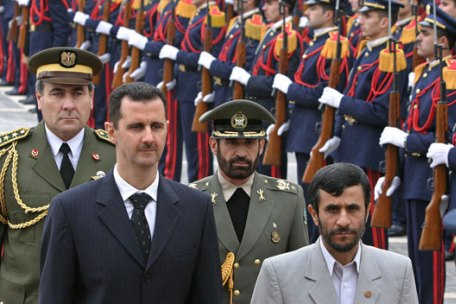Iran’s Unilateral Support of Assad to Harm Iran

IRD: After the fall of the Libyan government, Syrian developments are now being paid attention to. Bashar al-Assad has been under the strongest domestic and international pressure in recent weeks. Mohammad Ali Sobhani argues that the Iranian unilateral position of supporting Syria can challenge our position against other regional developments:
IRD: What are the main demands of the protesters in Syria?
MS: The demands of the people and protestors against Bashar Assad’s government are the same as what is proposed in other countries; i.e. the issue that one person and one family has been ruling for 48 years, irresponsibly suppressing all opposition. For example, the Syrians have not let Akhavan al-Muslemin (the Muslim Brotherhood) perform its activities, suppressing it several times, going even further by answering the membership of the party with the death penalty. Therefore, the fundamental rights of the people have been ignored for half a century.
IRD: What is the nature of the opposing groups? What is the role of the Islamic groups?
MS: The Arab world has a particular political structure that has existed for decades. In Syria, there is the same structure: Ghomin has been the most effective among all groups in the Arab countries. In second place there stand Islamic groups that existed before the Islamic Revolution. Although liberal and secular forces also have their own history in the Arab world with different effects in various countries, they also exist in the Arab world. All of these groups are present in Syria, showing their opposition to Assad in one way or another.
IRD: It seems that there are some attempts similar to those in Libya to form a council called the “Transition Council”. Is such a thing possible in Syria?
MS: It seems that it is easier in Syria, as there is no opposition in the country. Anyway, the Syrian people are more educated, experienced in the political developments of half a century, and have pursued serious political campaigns. What is different here is the presence of Israel due to the issue of Lebanon and Syria’s position in the Resistance front.
IRD: How do the Syrian developments affect the Resistance front? Can the possible overthrow of Assad cause Hezbollah to lose its power in Lebanon?
MS: Due to the Golan Heights issue, any government that comes to power in Syria cannot have good relations with Israel and consequently it will remain in the Resistance front. But Hezbollah will not be destroyed if Assad is removed from power, as the group has its own supporters.
IRD: What should Iran’s position be regarding Syrian developments?
MS: Any government that comes to power in Syria needs Iran’s support; i.e., Syria needs Iran due to its influence in Lebanon, the opposition against Israel, and the Golan Heights issue. Now Iran’s position on Syria should be discussed with the possibility of the fall of Assad in mind-- there is no way back for Assad as the government continues to answer the opposition with military attacks-- especially when the UN Security Council interferes militarily in countries’ affairs to preserve human rights. Therefore, there is only the possibility of carrying out reforms and giving many incentives to the protestors and the West.

